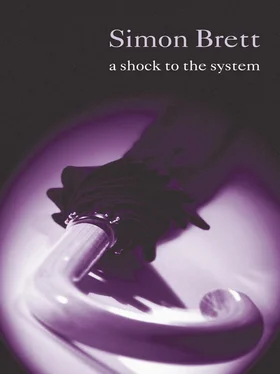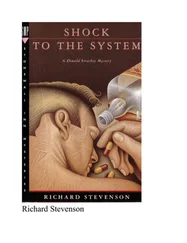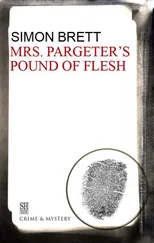Simon Brett - A Shock to the System
Здесь есть возможность читать онлайн «Simon Brett - A Shock to the System» весь текст электронной книги совершенно бесплатно (целиком полную версию без сокращений). В некоторых случаях можно слушать аудио, скачать через торрент в формате fb2 и присутствует краткое содержание. Жанр: Криминальный детектив, на английском языке. Описание произведения, (предисловие) а так же отзывы посетителей доступны на портале библиотеки ЛибКат.
- Название:A Shock to the System
- Автор:
- Жанр:
- Год:неизвестен
- ISBN:нет данных
- Рейтинг книги:3 / 5. Голосов: 1
-
Избранное:Добавить в избранное
- Отзывы:
-
Ваша оценка:
- 60
- 1
- 2
- 3
- 4
- 5
A Shock to the System: краткое содержание, описание и аннотация
Предлагаем к чтению аннотацию, описание, краткое содержание или предисловие (зависит от того, что написал сам автор книги «A Shock to the System»). Если вы не нашли необходимую информацию о книге — напишите в комментариях, мы постараемся отыскать её.
A Shock to the System — читать онлайн бесплатно полную книгу (весь текст) целиком
Ниже представлен текст книги, разбитый по страницам. Система сохранения места последней прочитанной страницы, позволяет с удобством читать онлайн бесплатно книгу «A Shock to the System», без необходимости каждый раз заново искать на чём Вы остановились. Поставьте закладку, и сможете в любой момент перейти на страницу, на которой закончили чтение.
Интервал:
Закладка:
Graham felt confident that they were in good hands. Absurdly, that little righteous sensation of being a model father returned to him. There he was, selflessly doing what was best for his children.
Lilian was also conveniently looked after. Though Graham’s sole interest in her was that they should never meet again, he was aware that appearances must be kept up. To banish her too suddenly from his life might draw attention to his behaviour, and he knew that all his future plans depended on maintaining a low profile.
He had therefore talked very solicitously to the hospital doctor about his mother-in-law’s condition. She was obviously in a state of shock, he agreed, after her daughter’s death, but he did not feel this could have been helped by the additional stress of looking after her two grandchildren. He was also certain that staying in the house where her daughter had died must have been a contributory factor in her suffering, and felt it would be better if she returned to her own flat. It was not, of course, that he was unwilling to look after her, but he felt his own emotional stability to be so precarious that he feared he might do more harm than good. Since his own unhappiness sprang from the same cause as his mother-in-law’s, namely Merrily’s death, he feared that the two of them together might only exacerbate each other’s distress.
He found, as he made his recitation, a full repertoire of pauses, sighs and sobs came unbidden to his aid, and the performance was taken at face value. The doctor agreed with what he said, regretted Mrs. Hinchcliffe’s uncompromising hostility towards her surviving daughter, and arranged for her to return to her own flat, where a voluntary helper would stay with her over the weekend.
Graham was thus freed to enjoy his solitude.
That solitude was not uninterrupted. There were still phone calls of sympathy from former friends, and the estate agent sent round four couples at intervals to inspect the property. All of these were properly respectful of his recently bereaved status. They regretted, from his point of view, the need to sell the house, but could see exactly why he was doing it. Three of the couples showed a gratifying amount of interest and one implied that some form of offer might not be long in coming.
This pleased Graham, because, although he felt at ease alone in the house that day, his happiness arose from the solitude rather than the surroundings. The house was too large and raised too many responsibilities. Since Merrily’s death it had quickly got untidy and Lilian’s barnstorming forays with Hoover and duster had made little impression. Then Graham found that he was having to devote time to washing shirts and socks. He also looked with distaste at, but ultimately ignored, the rising tide of dirty clothes in the children’s bedrooms. Perhaps Charmian should move ud her proposed schedule. He couldn’t cope for long with the constant kitting-out and other services that Henry and Emma required.
He also resented the clutter of the house, the volume of furniture and bits that Merrily had accumulated. Though he had been present, and even consulted, at many of the purchases, he thought of it all as exclusively hers. Now she was gone, and the house soon to go, he would sell the lot, piano, pine dressers, hatstands, rocking chairs, knick-knacks — all could go to the first bidder.
Yes, the sooner he was installed in his nice little service flat, the better.
A pleasing thought struck him. The normal inhibition of house purchase, unwillingness to be saddled, however briefly, with two mortgages, did not apply to him. Merrily’s death, something he now saw as an artefact, with its own perfection of design, had freed him from such restrictions. There was nothing to stop him from looking for, or indeed buying and moving into, a flat straight away.
But not yet. He would keep this weekend to himself, cosset himself a little, recoup, build up his strength for the next test.
And read. He had bought another book about murderers, this time one by a Home Office pathologist. The subject was beginning to fascinate him, but the fascination was not that of prurience. His interest was detached, professional, almost academic. He shook his head over the follies of past murderers, their carelessness, their lack of proper planning. He felt towards them much as he had towards his colleagues at Crasoco, that they were maybe good, but that in a straight race he had the skills to beat them.
His feelings towards the murderers, however, were subtly different. With them he felt an identity, a mild regret for their failures, a unity in the freemasonry of murder.
He experienced mild anxiety about his growing interest in the subject. Any behaviour tainted with obsession was alien to him. The first murder had been an accident, and Merrily’s a logical solution to a problem. He must never begin to think of murder as more than a means to an end.
And what was the end he had in view? He decided he should devote a little time to the analysis of his motives.
His main reason for killing his wife had been financial. Her death offered him a way out of a situation that threatened to reproduce his parents’ parsimonious existence. It also brought other benefits, freed him from unwelcome responsibilities, and offered him the chance of living the sort of life he wanted.
And what did he want? An hotel-like environment, and no emotional ties. Freedom to be himself, do what he chose. To have a nice flat, a nice car, enough money, go out where and when he wanted. And with whom. He was not yet sure to what extent sex would play a part in his new life, but it was an option not to be forgotten.
By one murder, he had achieved most of those objectives. With Merrily and the children out of his life, there was nothing to stop him from building up his dream.
Why then did he not feel complete satisfaction? What was the little unease in his mind?
Deep down he knew, but he teased himself by withholding the answer for a little while.
It was work. His image of his free self had projected a Graham Marshall who was Head of Personnel at Crasoco, not a passed-over and resented assistant to another appointee.
Robert Benham was the problem.
And while there might be political ways within the Crasoco system of dealing with that problem, there was another, much quicker, method. Robert might talk airily of Human Resources, but he was not aware of the inhuman resources of his rival.
It was not just a morbid fascination with murder that brought Graham to his conclusion. To kill Robert Benham was the logical thing to do.
Accepting this fact, one which had recently popped in and out of his mind with some frequency, gave it official status. Now he had declared his intention to himself, he could begin to plan.
The murder of Robert Benham would not be as easily accomplished as that of Merrily Marshall. Though he felt pride in the achievement of his wife’s death, Graham could see the advantages which he had when planning it. A knowledge of her habits and a knowledge of her environment had both helped. Lack of any motive apparent to the outside world had also been on his side. Living in the same house, he had had time and opportunity to set up the means of her removal. And his absence in Brussels had ensured its remote operation. Setting it in perspective, after, the first euphoria of achievement, he could see that it was a good murder, but not a great murder.
To dispose of Robert Benham he would need something rather better. And in the case of Benham, he might be seen to have a discernible motive, so greater caution would be required.
Like Merrily’s, he decided, the young man’s death must appear to be accidental. Though he thought he had the skills to divert suspicion from himself in a murder investigation, life would be considerably simplified if no such investigation were ever started.
Читать дальшеИнтервал:
Закладка:
Похожие книги на «A Shock to the System»
Представляем Вашему вниманию похожие книги на «A Shock to the System» списком для выбора. Мы отобрали схожую по названию и смыслу литературу в надежде предоставить читателям больше вариантов отыскать новые, интересные, ещё непрочитанные произведения.
Обсуждение, отзывы о книге «A Shock to the System» и просто собственные мнения читателей. Оставьте ваши комментарии, напишите, что Вы думаете о произведении, его смысле или главных героях. Укажите что конкретно понравилось, а что нет, и почему Вы так считаете.












